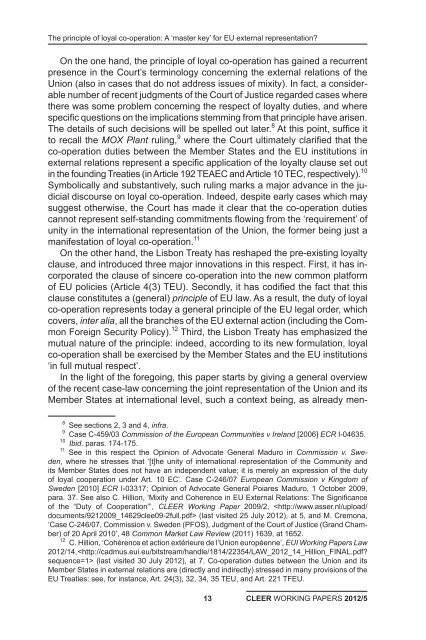CLEER WORKING PAPERS 2012/5Casolarispeaking, the <strong>EU</strong> <strong>external</strong> <strong>representation</strong> performs a threefold function. First,it concerns the political involvement <strong>of</strong> the Union in the international arena, <strong>and</strong>encompasses both the issuing <strong>of</strong> statements <strong>of</strong> a political nature <strong>and</strong> the adoption<strong>of</strong> political commitments (e.g. memor<strong>and</strong>a <strong>of</strong> underst<strong>and</strong>ing). Second, the<strong>EU</strong> <strong>representation</strong> relates to the exercise by the Union <strong>of</strong> the treaty-makingpower established in the founding Treaties <strong>and</strong> thus covers issues dealing withthe negotiation, signing <strong>and</strong> conclusion <strong>of</strong> international agreements. Third,<strong>representation</strong> concerns the manifestation, from a legal point <strong>of</strong> view, <strong>of</strong> theUnion’s position in international fora. The focus <strong>of</strong> this paper will be devotedsolely to the last two aspects related to the <strong>EU</strong> <strong>external</strong> <strong>representation</strong>. Furthermore,due to the lead taken by the ECJ in defining the scope <strong>and</strong> the implications<strong>of</strong> the loyalty principle, the paper will be essentially focused on theanalysis <strong>of</strong> its relevant case-law.In effect, the interaction between co-operation duties <strong>and</strong> the <strong>external</strong> action<strong>of</strong> the Union has been evoked on several occasions by the Court <strong>of</strong> Justice.Interestingly enough, however, in the early cases the Court’s terminology didnot expressly mention the principle <strong>of</strong> loyal co-operation. The Court exclusivelystipulated the existence <strong>of</strong> co-operation duties, <strong>and</strong> examined their applicationin the context <strong>of</strong> mixed agreements. In particular, the Court made itclear that, where it appears that a subject matter <strong>of</strong> an agreement falls in partwithin the jurisdiction <strong>of</strong> a Community <strong>and</strong> in part within that <strong>of</strong> the MemberStates, ‘a close association between the institutions <strong>of</strong> the Community <strong>and</strong> theMember States both in the process <strong>of</strong> negotiation <strong>and</strong> conclusion <strong>and</strong> in thefulfilment <strong>of</strong> the obligations entered into’ should be ensured. 5 Initially, the meaning<strong>of</strong> such an obligation was clarified in the ambit <strong>of</strong> the European AtomicEnergy Community (EAEC). Then, the Court specified that ‘[t]his duty <strong>of</strong> cooperation,to which attention was drawn in the context <strong>of</strong> the EAEC Treaty, mustalso apply in the context <strong>of</strong> the EEC [European Economic Community] Treatysince it results from the requirement <strong>of</strong> unity in the international <strong>representation</strong><strong>of</strong> the Community’. 6Despite the affirmation <strong>of</strong> a close linkage between the co-operation duties<strong>and</strong> the <strong>external</strong> <strong>representation</strong> <strong>of</strong> the Union, the absence <strong>of</strong> references in thecase-law to the loyalty principle prevented from clearly assessing its role in thisrespect. 7 In the last few years, however, new features emerged, which couldhelp to clarify what the duty <strong>of</strong> sincere co-operation in the international arenamay entail.5 Opinion 1/78 Draft Convention <strong>of</strong> the International Atomic Energy Agency on the PhysicalProtection <strong>of</strong> Nuclear Materials, Facilities <strong>and</strong> Transports [1978] ECR 2151, para. 34.6 Opinion 2/91 Convention Nº 170 <strong>of</strong> the International Labour Organization concerning safetyin the use <strong>of</strong> chemicals at work [1993] ECR I-01031, para. 36. See also Opinion 1/94 Competence<strong>of</strong> the Community to conclude international agreements concerning services <strong>and</strong> the protection <strong>of</strong>intellectual property [1994] ECR I-05267, para. 108, <strong>and</strong> Opinion 2/00 Cartagena Protocol [2001]ECR I-09713, para. 18.7 D. Verwey, The European Community, the European Union <strong>and</strong> the International Law <strong>of</strong>Treaties, The Hague: T.M.C <strong>Asser</strong> Press, 2004, at 51; J. Heliskoski, ‘Should There Be A NewArticle on External Relations? Opinion 1/94 “Duty <strong>of</strong> Cooperation” in the Light <strong>of</strong> the ConstitutiveTreaties’, in M. Koskenniemi (ed.), Leiden: Martinus Nijh<strong>of</strong>f Publishers, 1998, 273, at 274.12
The principle <strong>of</strong> loyal co-operation: A ‘master key’ for <strong>EU</strong> <strong>external</strong> <strong>representation</strong>?On the one h<strong>and</strong>, the principle <strong>of</strong> loyal co-operation has gained a recurrentpresence in the Court’s terminology concerning the <strong>external</strong> relations <strong>of</strong> theUnion (also in cases that do not address issues <strong>of</strong> mixity). In fact, a considerablenumber <strong>of</strong> recent judgments <strong>of</strong> the Court <strong>of</strong> Justice regarded cases wherethere was some problem concerning the respect <strong>of</strong> loyalty duties, <strong>and</strong> wherespecific questions on the implications stemming from that principle have arisen.The details <strong>of</strong> such decisions will be spelled out later. 8 At this point, suffice itto recall the MOX Plant ruling, 9 where the Court ultimately clarified that theco-operation duties between the Member States <strong>and</strong> the <strong>EU</strong> institutions in<strong>external</strong> relations represent a specific application <strong>of</strong> the loyalty clause set outin the founding Treaties (in Article 192 TEAEC <strong>and</strong> Article 10 TEC, respectively). 10Symbolically <strong>and</strong> substantively, such ruling marks a major advance in the judicialdiscourse on loyal co-operation. Indeed, despite early cases which maysuggest otherwise, the Court has made it clear that the co-operation dutiescannot represent self-st<strong>and</strong>ing commitments flowing from the ‘requirement’ <strong>of</strong>unity in the international <strong>representation</strong> <strong>of</strong> the Union, the former being just amanifestation <strong>of</strong> loyal co-operation. 11On the other h<strong>and</strong>, the Lisbon Treaty has reshaped the pre-existing loyaltyclause, <strong>and</strong> introduced three major innovations in this respect. First, it has incorporatedthe clause <strong>of</strong> sincere co-operation into the new common platform<strong>of</strong> <strong>EU</strong> policies (Article 4(3) T<strong>EU</strong>). Secondly, it has codified the fact that thisclause constitutes a (general) principle <strong>of</strong> <strong>EU</strong> law. As a result, the duty <strong>of</strong> loyalco-operation represents today a general principle <strong>of</strong> the <strong>EU</strong> legal order, whichcovers, inter alia, all the branches <strong>of</strong> the <strong>EU</strong> <strong>external</strong> action (including the CommonForeign Security Policy). 12 Third, the Lisbon Treaty has emphasized themutual nature <strong>of</strong> the principle: indeed, according to its new formulation, loyalco-operation shall be exercised by the Member States <strong>and</strong> the <strong>EU</strong> institutions‘in full mutual respect’.In the light <strong>of</strong> the foregoing, this paper starts by giving a general overview<strong>of</strong> the recent case-law concerning the joint <strong>representation</strong> <strong>of</strong> the Union <strong>and</strong> itsMember States at international level, such a context being, as already men-8 See sections 2, 3 <strong>and</strong> 4, infra.9 Case C-459/03 Commission <strong>of</strong> the European Communities v Irel<strong>and</strong> [2006] ECR I-04635.10 Ibid. paras. 174-175.11 See in this respect the Opinion <strong>of</strong> Advocate General Maduro in Commission v. Sweden,where he stresses that ‘[t]he unity <strong>of</strong> international <strong>representation</strong> <strong>of</strong> the Community <strong>and</strong>its Member States does not have an independent value; it is merely an expression <strong>of</strong> the duty<strong>of</strong> loyal cooperation under Art. 10 EC’. Case C-246/07 European Commission v Kingdom <strong>of</strong>Sweden [2010] ECR I-03317; Opinion <strong>of</strong> Advocate General Poiares Maduro, 1 October 2009,para. 37. See also C. Hillion, ‘Mixity <strong>and</strong> Coherence in <strong>EU</strong> External Relations: The Significance<strong>of</strong> the “Duty <strong>of</strong> Cooperation”’, CLEER Working Paper 2009/2, (last visited 25 July 2012), at 5, <strong>and</strong> M. Cremona,‘Case C-246/07, Commission v. Sweden (PFOS), Judgment <strong>of</strong> the Court <strong>of</strong> Justice (Gr<strong>and</strong> Chamber)<strong>of</strong> 20 April 2010’, 48 Common Market Law Review (2011) 1639, at 1652.12 C. Hillion, ‘Cohérence et action extérieure de l’Union européenne’, <strong>EU</strong>I Working Papers Law2012/14, (last visited 30 July 2012), at 7. Co-operation duties between the Union <strong>and</strong> itsMember States in <strong>external</strong> relations are (directly <strong>and</strong> indirectly) stressed in many provisions <strong>of</strong> the<strong>EU</strong> Treaties: see, for instance, Art. 24(3), 32, 34, 35 T<strong>EU</strong>, <strong>and</strong> Art. 221 TF<strong>EU</strong>.13CLEER WORKING PAPERS 2012/5
- Page 1: Founded in 2008, the Centre for the
- Page 4 and 5: CLEER WORKING PAPERS 2012/5Gosalbo
- Page 6 and 7: CLEER WORKING PAPERS 2012/5Gosalbo
- Page 8 and 9: CLEER WORKING PAPERS 2012/5Gosalbo
- Page 10 and 11: CLEER WORKING PAPERS 2012/5Blockman
- Page 12 and 13: CLEER WORKING PAPERS 2012/5Blockman
- Page 16 and 17: CLEER WORKING PAPERS 2012/5Casolari
- Page 18 and 19: CLEER WORKING PAPERS 2012/5Casolari
- Page 20 and 21: CLEER WORKING PAPERS 2012/5Casolari
- Page 22 and 23: CLEER WORKING PAPERS 2012/5Casolari
- Page 24 and 25: CLEER WORKING PAPERS 2012/5Casolari
- Page 26 and 27: CLEER WORKING PAPERS 2012/5Casolari
- Page 28 and 29: CLEER WORKING PAPERS 2012/5Casolari
- Page 30 and 31: CLEER WORKING PAPERS 2012/5Casolari
- Page 32 and 33: CLEER WORKING PAPERS 2012/5Casolari
- Page 34 and 35: CLEER WORKING PAPERS 2012/5Casolari
- Page 36 and 37: CLEER WORKING PAPERS 2012/5Casolari
- Page 38 and 39: CLEER WORKING PAPERS 2012/5Casolari
- Page 40 and 41: CLEER WORKING PAPERS 2012/5Van Elsu
- Page 42 and 43: CLEER WORKING PAPERS 2012/5Van Elsu
- Page 44 and 45: CLEER WORKING PAPERS 2012/5Van Elsu
- Page 46 and 47: CLEER WORKING PAPERS 2012/5Van Elsu
- Page 48 and 49: CLEER WORKING PAPERS 2012/5Van Elsu
- Page 50 and 51: CLEER WORKING PAPERS 2012/5Van Elsu
- Page 52 and 53: CLEER WORKING PAPERS 2012/5Van Elsu
- Page 54 and 55: CLEER WORKING PAPERS 2012/5Van Elsu
- Page 56 and 57: CLEER WORKING PAPERS 2012/5Van Elsu
- Page 58 and 59: CLEER WORKING PAPERS 2012/5Van Elsu
- Page 60 and 61: CLEER WORKING PAPERS 2012/5Van Elsu
- Page 62 and 63: CLEER WORKING PAPERS 2012/5Van Voor
- Page 64 and 65:
CLEER WORKING PAPERS 2012/5Van Voor
- Page 66 and 67:
CLEER WORKING PAPERS 2012/5Van Voor
- Page 68 and 69:
CLEER WORKING PAPERS 2012/5Van Voor
- Page 70 and 71:
CLEER WORKING PAPERS 2012/5Van Voor
- Page 72 and 73:
CLEER WORKING PAPERS 2012/5Van Voor
- Page 74 and 75:
CLEER WORKING PAPERS 2012/5Van Voor
- Page 76 and 77:
CLEER WORKING PAPERS 2012/5Van Voor
- Page 78 and 79:
CLEER WORKING PAPERS 2012/5Van Voor
- Page 80 and 81:
CLEER WORKING PAPERS 2012/5Van Voor
- Page 82 and 83:
CLEER WORKING PAPERS 2012/5Van Voor
- Page 84 and 85:
CLEER WORKING PAPERS 2012/5Van Voor
- Page 86 and 87:
CLEER WORKING PAPERS 2012/5McArdle
- Page 88 and 89:
CLEER WORKING PAPERS 2012/5McArdle
- Page 90 and 91:
CLEER WORKING PAPERS 2012/5McArdle
- Page 92 and 93:
CLEER WORKING PAPERS 2012/5McArdle
- Page 94 and 95:
CLEER WORKING PAPERS 2012/5McArdle
- Page 96 and 97:
CLEER WORKING PAPERS 2012/5McArdle
- Page 98 and 99:
CLEER WORKING PAPERS 2012/5McArdle
- Page 100 and 101:
CLEER WORKING PAPERS 2012/5McArdle
- Page 102 and 103:
CLEER WORKING PAPERS 2012/5McArdle
- Page 104 and 105:
CLEER WORKING PAPERS 2012/5McArdle
- Page 106 and 107:
CLEER WORKING PAPERS 2012/5Eckeswit
- Page 108 and 109:
CLEER WORKING PAPERS 2012/5Eckesdro
- Page 110 and 111:
CLEER WORKING PAPERS 2012/5Eckesto
- Page 112 and 113:
CLEER WORKING PAPERS 2012/5Eckesare
- Page 114 and 115:
CLEER WORKING PAPERS 2012/5EckesEU
- Page 116 and 117:
CLEER WORKING PAPERS 2012/5Eckeswil
- Page 118 and 119:
CLEER WORKING PAPERS 2012/5EckesPar
- Page 120 and 121:
CLEER WORKING PAPERS 2012/5Eckesthe
- Page 122 and 123:
CLEER WORKING PAPERS 2012/5Eckesise
- Page 124 and 125:
CLEER WORKING PAPERS 2012/5Eckesand
- Page 126 and 127:
CLEER WORKING PAPERS 2012/5Eckesto
- Page 128 and 129:
CLEER WORKING PAPERS 2012/5Eckesarg
- Page 130 and 131:
CLEER WORKING PAPERS 2012/5Wouters,
- Page 132 and 133:
CLEER WORKING PAPERS 2012/5Wouters,
- Page 134 and 135:
CLEER WORKING PAPERS 2012/5Wouters,
- Page 136 and 137:
CLEER WORKING PAPERS 2012/5Wouters,
- Page 138 and 139:
CLEER WORKING PAPERS 2012/5Wouters,
- Page 140 and 141:
CLEER WORKING PAPERS 2012/5Wouters,
- Page 142 and 143:
CLEER WORKING PAPERS 2012/5Wouters,
- Page 144 and 145:
CLEER WORKING PAPERS 2012/5Wouters,
- Page 146:
CLEER WORKING PAPERS 2012/5Wouters,








